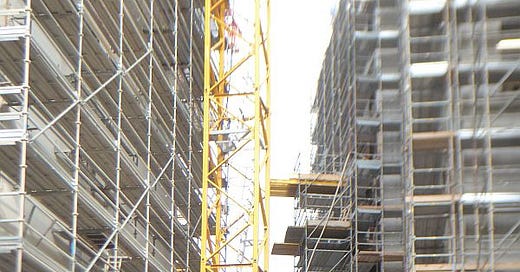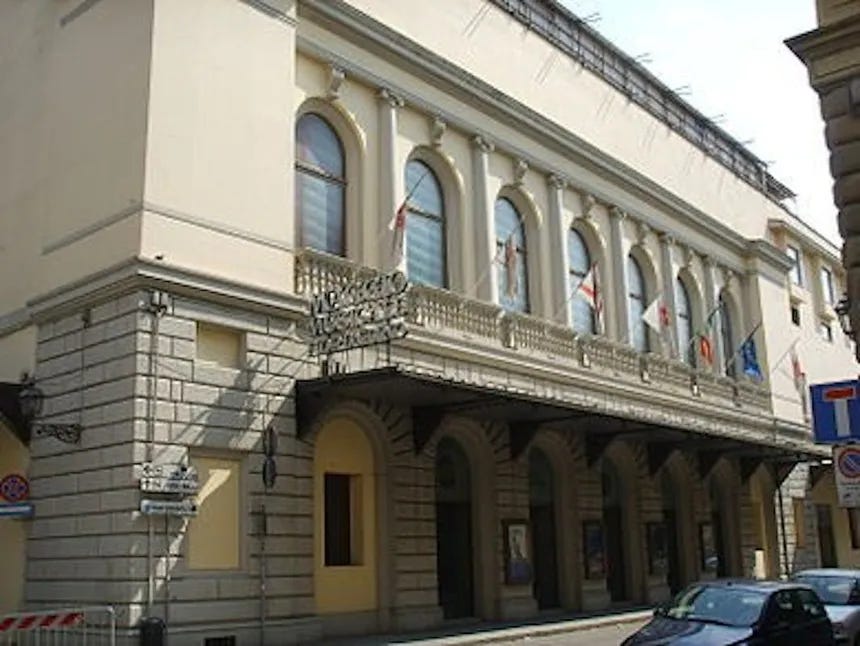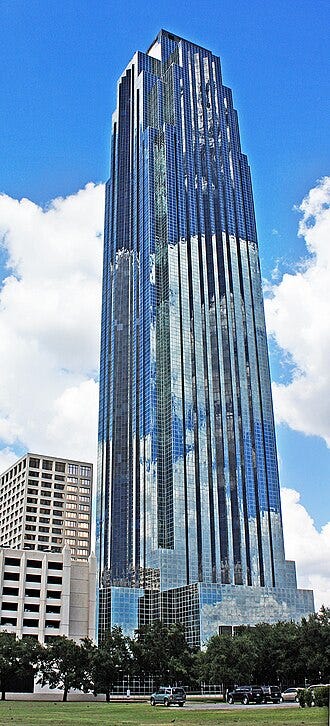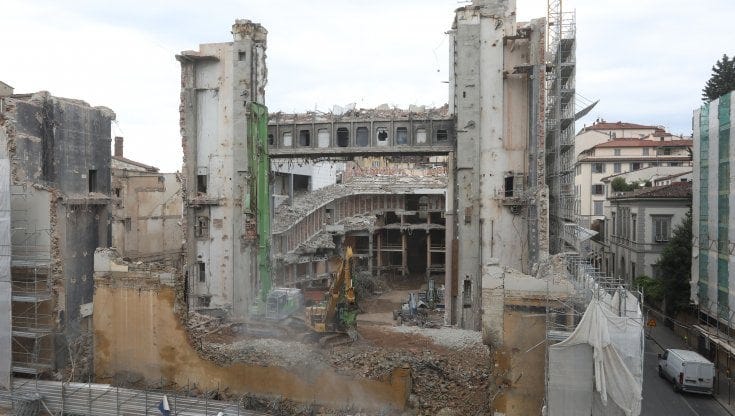The curse of mass tourism has turned Florence into a huge amusement park where tourists can enjoy overpriced accommodations, bad food, and long lines to access crowded museums. Above, you can see the transformation of the old city theater (“Teatro Comunale”) into one more shopping center plus luxury B&B apartments. One day, though, this huge building may well be occupied by Florentine commoners in search of refuge from the collapse of the Global Empire. It will be just like when Roman peasants found refuge in the palace of Emperor Diocletian after the fall of the Roman Empire.
The Diocletian Palace, located in the town of Split, Croatia, is an ancient palace built for the Roman emperor Diocletian at the end of the third century AD. It was designed as a luxurious retirement residence for the emperor and covered an area of about 30,000 square meters.
After the fall of the Roman Empire, the palace was abandoned, but the local population sought refuge within its walls during times of invasion and turmoil. Over the centuries, the palace gradually transformed into a city, with houses, shops, and churches being built within its walls. Still today, the features of the ancient palace can be seen in the layout of the modern city called “Split.” (The name may come from the Latin term “palatium,” meaning “palace.”)
We don’t know if the old Emperor Diocletian would have been happy to know that his luxurious palace would be used by commoners as their residence, but he did them a favor. In turn, we don’t know if the Medieval inhabitants of Split knew that they were living in the palace of an ancient Roman Emperor; probably not. The Emperor was buried in an expensive porphyry sarcophagus in his mausoleum inside the palace, but over the centuries, the sarcophagus was shattered, and Diocletian’s remains scattered around — maybe they are still somewhere in a basement in some house of Split. It is history marching on!
Now, the story of how the Municipal Theater in Florence may well follow a destiny similar to Diocletian’s Palace in Split.
Excerpt from Kelebeker Blog, by Miguel Martinez
Let's turn to the story of the Municipal Theater in Florence.
It is on the other side of the river, but it takes me less than a ten-minute walk to get there.
A few years ago, it looked like this, meek but elegant:
At some moment, the City of Florence, with Matteo Renzi as Mayor, sold the theater, a century and a half of history, to a bank called the Cassa e Deposito Prestiti.
That institution immediately put it up for auction, in 2014, for half its value, and it was bought by
"Ilaria Niccolai's Nikila Invest. Niccolai is the leading name in the Mall system that runs from Leccio Reggello to Fasano, in the province of Brindisi, via Sanremo."
But the Right-wing opposition discovered (and it's a good thing the opposition exists, whatever its color) that Nikila was, in turn, a partner in Party srl, of which Laura Bovoli, Matteo Renzi's mother, was a director and where the mayor's dad then had a 40 percent stake. Tiziano Renzi (Matteo Renzi’s dad) was the "marketing manager" of Nikila.
One of Nikila's partners was later arrested; and today “Nikila Invest” is in liquidation, for the glorious price of 15,000 euros.
At some point, the Cassa Depositi e Prestiti bought back the theater from Tiziano Renzi's partners and, in 2020, sold it to an investment fund, the British Blue Noble, which put the money in the Texas-based Hines, which is part of the Global thing.
Hines is headquartered in this pleasant place:
The Teatro Comunale is located in a highly protected UNESCO Area, where it is strictly forbidden to put a solar panel on the roof of my home.
As I pass by Corso Italia day by day, I see the theater being completely demolished except for the facade, which absurdly remains standing. They also demolished many buildings around it.
They dug a hole many meters deep in the center.
And then, at great speed, they build an eight-story building there.
I have to admit that there is a lot of work going on here.
In front, they re-glued the old facade of the theater for us and stuck posters explaining the mission of their speculation, which, if it sounds like a joke to you, means you are not up to date: (translated, it says “a new way of living a home in Florence for all. A new square, public areas, and pedestrian passages accessible to the community — Hines”)
This will create 156 luxury apartments for short rentals, the Teatro Luxury Apartments, with 170 parking spaces that will allow guests to drive their SUVs into the limited traffic area (ZTL).












European history in North America is obviously far less ancient than Europe's itself. However, years ago I visited Williamsburg VA, a place of historical note here in the US because it was a site of one of the first permanent English-speaking settlements in North America. It was built around 1700.
I expected to see 300-year-old buildings, only to find that the entire 300 acre site consisted of 20th century reconstructions of them. The only concession to history was their placement on original foundations or footprints. At least there I can understand why it was done--the original settlement had completely disappeared, and the area would have held no interest for anyone other than an archaeologist. But really, at some point, such "reconstructions" just turn historical landmarks into theme parks so that someone can make some money off of them from those dull enough to want to visit. Perhaps they believe that the ghosts of the original inhabitants might suffuse the location itself with their presence?
Thank goodness they haven't gotten to the Acropolis or the Parthenon yet...
Politics....
Business with state property is a common practice, today a lot of people think that politics is a fast way to money using just lies and social skills (aka deceiving, boot licking and similar), in our past there are other examples but honor, rectitude and principles were born during periods of war and today war is far away from us. They are necessary because you have to give your life to comrades that need be willing to risk their for your, and probably you have to give it for someone in another unit hoping they will do the same so cleaver backstabbing and similar child play are strongly discouraged (may kill you).
Florence is going to be a set for tourists like Florida, what is needed is to keep the people in the right place, joust outside the set for easy call if needed, and let the paying tourist to taste the "authentic" experience of what they image is Florence. Business want that reality conform to desire of clients and their needs, history is only a facade, a set for the photos, because Ruins are better, more romantics, and are simpler to administer: joust own them and let people pay to see, less maintenance is a good attitude for keep them because more they degrade more "romanticized" become and more people pay to see them because are going to disappear!
No hope for today work to become something useful, pre-industrial building was based on abundance of structural integrity to last the most with minimal maintenance for long time maximal gains, but today we make disposable sets, fast to build and fancy but maintenance intensive if you want to keep them for half a century. Money today is fast, dirty and moving, we have "markets" made of split second trades based on rumors and opinions, ruins need something different, need FAIRS, Champagne Fairs (https://en.wikipedia.org/wiki/Champagne_fairs), because need people ho fear time but accept it so looking at their work we can shake and be inspired like Shally who wrote Ozymandias.... because "Man fears time; time fears the Pyramids"!